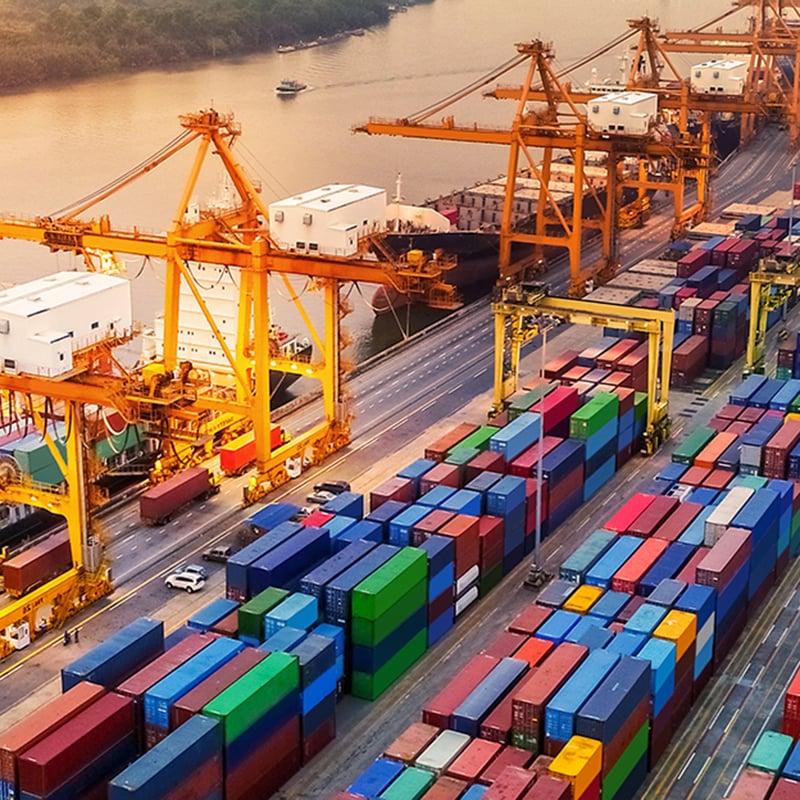It’s a new year, but the pandemic continues to cause supply chain disruptions worldwide, and there is no end in sight with the omicron variant exacerbating the global traffic jam. Surges in demand combined with clogged transportation systems have caused the cost of moving cargo to skyrocket. U.S. ports are overwhelmed with imported containers. It has become common to ship empty containers back to Asia because it is often more profitable than spending time and manpower filling containers, affecting U.S. exporters.
Against this backdrop, the Biden administration and federal agencies responsible for enforcement of the antitrust laws have repeatedly emphasized their focus on competition issues that affect the shipping and transportation industries. In this alert, we summarize the administration’s recent policy announcements and initiatives and highlight key takeaways as we sail into 2022.

2021 recap
1. Biden’s Executive Orders: A “whole-of-government” approach
Six months ago, President Biden issued Executive Order (EO) 14036, “Promoting Competition in the American Economy,” with the stated goal of fostering competition within the U.S. economy in light of increased corporate consolidation. EO 14036 and its accompanying Fact Sheet highlight a number of initiatives aimed at enhancing competition across multiple sectors. While EO 14036 did not immediately establish any new requirements, it is a call to action that seeks the cooperation of multiple federal agencies in reviewing issues and establishing new policies to implement the administration’s goals under a “whole-of-government” approach.
Specific to container shipping, EO 14036 notes that the global container shipping market is dominated by a small number of large companies and has rapidly consolidated since 2000, increasing costs and “leaving domestic manufacturers who need to export goods at these large foreign companies’ mercy.” EO 14036 encourages the Federal Maritime Commission (FMC) to vigorously enforce the prohibition of unjust and unreasonable practices in relation to “detention and demurrage” fees – fees that ocean carriers charge for time that freight is sitting in port waiting to be loaded and unloaded and for equipment that is not promptly returned.
An earlier Biden EO titled “America’s Supply Chains” (EO 14017) did not specifically target competition issues, but likewise seeks a “whole-of-government approach to assessing vulnerabilities in, and strengthening the resilience of, critical supply chains.” EO 14017 aligns with the Administration’s increased focus on the shipping industry, given the importance of global shipping to the supply chains that underpin economic activity across nearly all sectors.
2. Piling on: DOJ-FMC collaboration
In the same month that EO 14036 was issued, the FMC and the Antitrust Division of the Department of Justice (DOJ) entered into a memorandum of understanding relative to “Cooperation with Respect to Promoting Competitive Conditions in the U.S.-International Ocean Liner Shipping Industry.” The agencies agreed to share information “for the purpose of improving each agency’s effectiveness in carrying out its respective legal responsibilities.” They also agreed to confer, at least annually, to address law enforcement, regulatory, and other matters related to competitive conditions in the international ocean liner shipping industry. This is the first-ever agreement of this nature between the two agencies.
Importantly, unlike the FMC, the DOJ has criminal enforcement capabilities. Specifically, the DOJ has jurisdiction to enforce U.S. antitrust laws not only against domestic business activities but also against foreign business activities that have a substantial and intended effect in the United States, up to and including criminal prosecution. In recent years, the DOJ has indicted a foreign ocean liner shipping company and its executives in relation to a conspiracy regarding allocation of customers and routes, bid rigging, price fixing, and other anticompetitive conduct in the international roll-on, roll-off ocean shipping industry, resulting in guilty pleas, hefty fines, and prison time for individuals, not just for the company and its executives, but also for four other competitors that were found to have participated in the conspiracy. The DOJ’s prosecutions followed a European Union antitrust probe into the container line shipping industry, which was resolved in 2016 when 14 companies entered into legally binding commitments to increase price transparency for customers and reduce the likelihood of coordinating prices.
The FMC, on the other hand, has jurisdiction to investigate and sanction ocean carriers that implement unfair and unreasonable practices in violation of the U.S. Shipping Act. Specifically, the FMC brings enforcement actions and issues civil penalties against ocean carriers; the FMC also adjudicates private party actions brought by cargo owners and awards reparations. The FMC has intensified its efforts to use these tools against ocean carriers, in particular in relation to their demurrage and detention practices during the COVID-related port congestion crisis. The most recent illustrations are three policy statements issued by the FMC last month to encourage shippers to file private party complaints against ocean carriers, either individually or collectively, and to protect them from retaliation and attorney fees awards when such actions were brought in good faith. In one of these statements, the FMC recognized that private actions are important to alert the agency of potential violations and to deter unfair and unreasonable conduct by carriers.
The new collaboration between the FMC and the DOJ demonstrates that the agencies are taking seriously the Biden administration’s encouragement to ramp up enforcement of unlawful and anticompetitive activity in the international shipping industry. In particular, the DOJ’s cooperation gives sharper teeth to the initiative due to the DOJ’s capacity to prosecute criminal activity.
